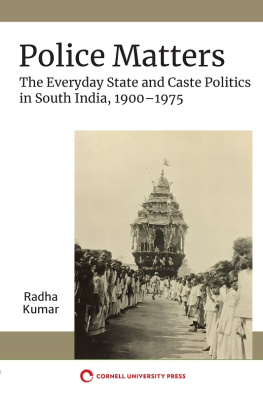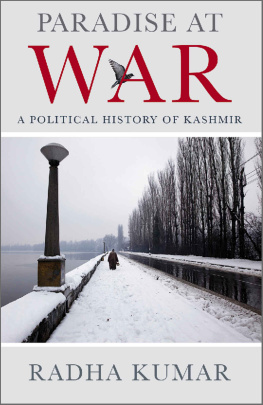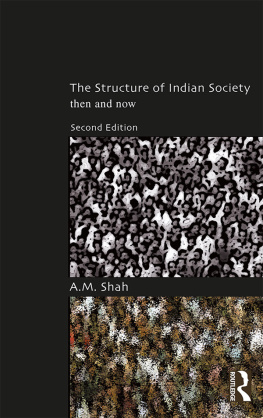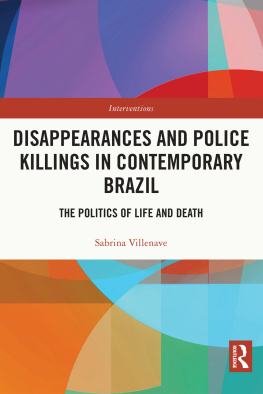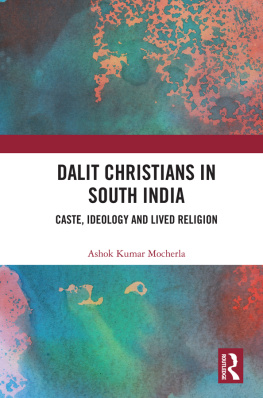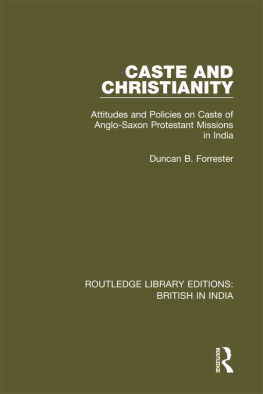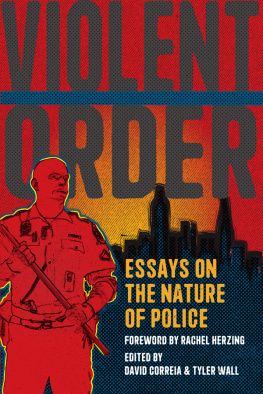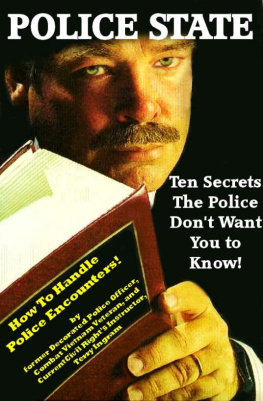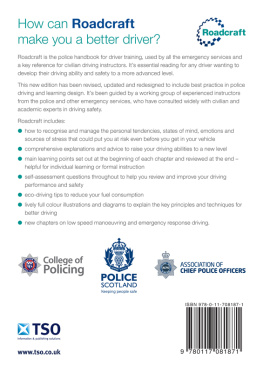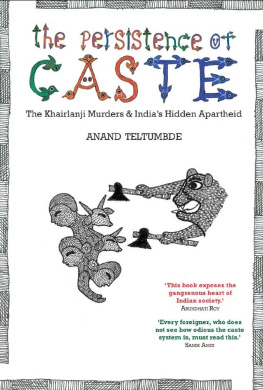Police Matters
Police Matters
The Everyday State and Caste Politics
in South India, 19001975
Radha Kumar
Cornell University Press
Ithaca and London
Copyright 2021 by Cornell University
The text of this book is licensed under a Creative Commons
Attribution-NonCommercial-NoDerivatives 4.0 International
License: https://creativecommons.org/licenses/by-nc-nd/4.0/.
To use this book, or parts of this book, in any way not covered
by the license, please contact Cornell University Press, Sage
House, 512 East State Street, Ithaca, New York 14850.
Visit our website at cornellpress.cornell.edu.
First published 2021 by Cornell University Press
Library of Congress Cataloging-in-Publication Data
Names: Kumar, Radha, 1981 author.
Title: Police matters: the everyday state and caste politics in south India,
19001975 / by Radha Kumar.
Description: Ithaca [New York]: Cornell University Press, [2021] |
Includes bibliographical references and index.
Identifiers: LCCN 2021005664 (print) | LCCN 2021005665 (ebook) |
ISBN 9781501761065 (paperback) | ISBN 9781501760860 (pdf) |
ISBN 9781501760877 (epub)
Subjects: LCSH: PoliceIndiaTamil NaduHistory20th century. |
Law enforcementIndiaTamil NaduHistory20th century. | CastePolitical aspectsIndiaTamil NaduHistory. | Police-community relationsIndiaTamil NaduHistory20th century. | Caste-based discriminationIndiaTamil NaduHistory20th century.
Classification: LCC HV8249.T3 K86 2021 (print) | LCC HV8249.T3 (ebook) | DDC 363.20954/820904dc23
LC record available at https://lccn.loc.gov/2021005664
LC ebook record available at https://lccn.loc.gov/2021005665
Cover image: The Car en Route, Srivilliputtur, c. 1935.
The British Library Board, Carleston Collection:
Album of Snapshot Views in South India, Photo 628/1 (40).
------------------------------
This book is published as part of the Sustainable History Monograph Pilot. With the generous support of the Andrew W. Mellon Foundation, the Pilot uses cutting-edge publishing technology to produce open access digital editions of high-quality, peer-reviewed monographs from leading university presses. Free digital editions can be downloaded from: Books at JSTOR, EBSCO, Internet Archive, OAPEN, Project MUSE, and many other open repositories.
While the digital edition is free to download, read, and share, the book is under copyright and covered by the following Creative Commons License: BY-NC-ND 4.0. Please consult www.creativecommons.org if you have questions about your rights to reuse the material in this book.
When you cite the book, please include the following
URL for its Digital Object Identifier (DOI):
https://doi.org/10.7298/j2j5-ya41
We are eager to learn more about how you discovered this title and how you are using it. We hope you will spend a few minutes answering a couple of questions at this url:
https://www.longleafservices.org/shmp-survey/
More information about the Sustainable History
Monograph Pilot can be found at
https://www.longleafservices.org .
A first book is the product of support from many, going well beyond the actual topic researched. Through the past decade and more, Gyan Prakash has, with unfailing patience and kindness, provided direction to my research and guidance as I navigated academia. Bhavani Raman pushed me to search deeper for arguments; her warmth gave me the strength to do so. This book owes a lot to the two of them. I am grateful for Sumathi Ramaswamys inspiring scholarship, and for her companionship at the dusty Tamil Nadu Archives! Her incisive comments have enriched this work. Many thanks to Mitra Sharafi and the anonymous reader for Cornell University Press, whose careful reading and constructive comments were vital in sharpening my argument.
At Princeton, Anson Rabinbach guided me through the labyrinths of Benjamins writing; in addition, his sharp reading of my dissertation was central to revising it into book form. Kevin Kruse conducted a dissertation workshop that clarified my priorities for the subsequent ten years. At Delhi University, where I did my MA, I was taught by a stellar faculty that included Sumit Sarkar, Shahid Amin, and Dilip Menon. R. Umamaheshwari opened my eyes to the possibilities of history when I was an undergraduate. I wrote my first-ever research paper at IIM Ahmedabad, where M. S. Sriram educated me on microfinance and on working with primary data.
I started collecting material for this project at established archives, but all the while, I was also hunting for police writing that might be more textured than published reports or memoirs. Almost two years into my project, after several dead ends, and one week before a flight back to the United States, a contact led me to old records kept in rural police stations. As I sat in Manur station in Tirunelveli district, reading with disbelief detailed police notes on rural life from the 1930s, I realized that I would have to reframe all the material I had collected so far. My deepest gratitude to C. M. Ranjani, Shridhar Chittappa, and Veerabadran for helping me access the Tamil Nadu police department. And I cannot thank enough Mr. Abhash Kumar, Mr. Vijayendra Bidari, Mr. Ashok Kumar, and Mr. A. K. Viswanathan of the Indian Police Service who gave me access to these precious records. In Chennai, the services of Mr. Neelavannan, Mr. Suresh, Mr. Kevin, and Mr. Sivakumar were indispensable in making accessible the riches of the Tamil Nadu Archives. I also thank the staff and librarians at the British Library, London; the District Record Centre, Madurai; Roja Muthiah Research Library, Chennai; Connemara Library, Chennai; Theekadir , Madurai (whose staff willingly dug old newspapers out of warehouses to help me); Firestone Library, Princeton; and Bird Library, Syracuse, for their help. Heartfelt thanks to the people of Keezhathooval, including Mr. Govindan, sole surviving eyewitness to the 1957 shooting, whom I interviewed in the summer of 2015.
I have presented parts of this work at various venues: Princetons Colonial and Imperial Workshop (2012), the Modern South Asia Workshop at Yale University (2012), the Tamil Studies Conference at the University of Toronto (2012), the Penn Program on Democracy, Citizenship and Constitutionalism (2013), the South Asia Graduate Research workshop at NYU (2014), the South Asia Conference at the University of Wisconsin-Madison (2012, 2015), the Cornell South Asia Program (2015), the workshop on Violence, Colonialism and Empire in the Modern and Contemporary World at the British Academy (2015), the Moynihan Research Workshop at the Maxwell School, Syracuse University (2015), Midnights Institutions at Yale University (2016), the Moynihan Book Prospectus Workshop (2016), the AIIS Dissertation to Book Workshop (2016), the American Society for Legal History Conference (2016), the Criminology and Sociolegal Studies Seminar Series at the University of Toronto (2016), Policing in South Asia at Jawaharlal Nehru University (2018), and the Global History and World Literature workshop at the University of Victoria, British Columbia (2018). I thank the hosts and participants at these events for their support and feedback on my work. Special thanks to David Ludden, Mitra Sharafi, Robert Travers, and A. R. Venkatachalapathy, whose comments at these conferences (likely unknown to them!) were quite important to refining my arguments. All errors remain mine.

